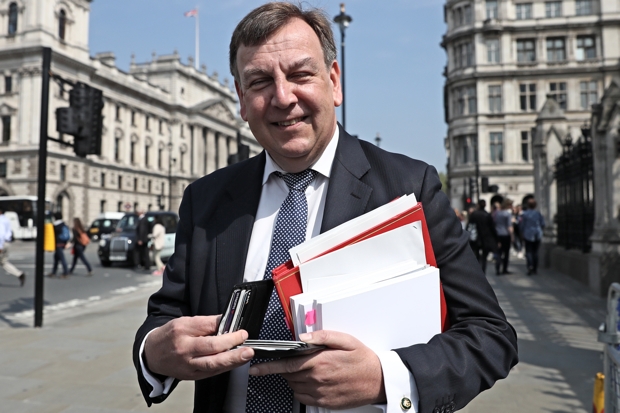Of all the things wrong with the BBC, it would be hard to argue that a shortage of gay people making and presenting programmes is one of them. As Andrew Marr observed a decade ago: ‘The BBC is not impartial or neutral. It’s a publicly funded, urban organisation with an abnormally large number of young people, ethnic minorities, and gay people. It has a liberal bias, not so much a party-political bias. It is better expressed as a cultural liberal bias.’
Why, then, is the government intent on making the BBC even more gay? In one of the less-reported sections of this week’s white paper on the future of the corporation, John Whittingdale lays down a target that 10 per cent of senior leadership roles at the BBC be filled by LGBT staff by 2020.
Leaving aside for now the argument of whether we should have quotas for minority groups at all, a 10 per cent target for LGBT is bizarre. The official government figure for Britain’s LBGT population – obtained by means of a direct question posed to respondents in the Office of National Statistics’ Integrated Household Survey – is 1.5 per cent. Of course, there is an argument that many gay people may be reluctant to self-identify themselves as such. But if they won’t tell the ONS that they are gay they are probably not going to tell the BBC’s human resources department either. In trying to reach its target of having 10 per cent of senior roles filled by LGBT people the BBC can only go by what employees have declared on official forms. If the BBC filled 10 per cent of its management roles with people who have self-identified as being LGBT, it would in reality have a far higher proportion than this, thanks to LGBT people who are too shy to declare their orientation.
Even if one did make the fairly preposterous assumption that BBC staff are happy to tell their employers about their sexual orientation when they won’t tell the ONS, a 10 per cent target is still hugely over-representative. The gay rights group Stonewall puts its own estimate of Britain’s LGBT population at between 5 and 7 per cent. Ten per cent is the figure that the US National Gay Task Force presented to the US government in 1977, based on a crude interpretation of the works of Indiana University biologist Alfred Kinsey, works which are themselves now largely discredited.
The BBC white paper also sets a target for 15 per cent of its senior roles to be filled by Black, Asian and minority ethnic (BAME) employees by 2020. This is not out of line with the general population – the ONS currently estimates 13 per cent of the population to be BAME, a proportion which at recent growth rates will be close to 15 per cent in 2020.
So why demand over-representation of gay people? I am speculating here, but this is all I can think of. The government is terrified of the BBC. In order to have something in the white paper which it thought might please the BBC’s liberal-minded elite – and so balance the stuff ministers knew that elite wouldn’t like – it came up with the idea of enshrining ‘diversity’ in the BBC’s charter for the first time. Trouble is, when it looked at the figures it found that Andrew Marr’s observation was correct – the BBC’s staff is already significantly over-represented by LBGT people. And so, in order to come up with some sort of meaningful target, it came up with the 10 per cent figure.
If anyone in the the government or the BBC disputes the above, please do provide us with an alternative explanation as to why the BBC’s charter should demand that LBGT people be overrepresented to the tune of anything between 30 per cent and 600 per cent, depending on which estimate you use for the general population.
I am not, by the way, demanding a quota that doesn’t discriminate against the heterosexual population. I would rather we dropped all equality quotas. I am quite happy to trust the BBC’s managers to employ the best people for the job, without having to look over their shoulder at some bean-counter from the diversity department.







Comments